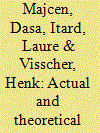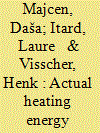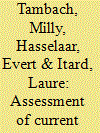|
|
|
Sort Order |
|
|
|
Items / Page
|
|
|
|
|
|
|
| Srl | Item |
| 1 |
ID:
125538


|
|
|
|
|
| Publication |
2013.
|
| Summary/Abstract |
Energy labels in buildings are awarded based on theoretical gas and electricity consumption based on dwelling's physical characteristics. Prior to this research, a large-scale study was conducted in The Netherlands comparing theoretical energy use with data on actual energy use revealing substantial discrepancies (Majcen et al., 2013). This study uses identical energy label data, supplemented with additional data sources in order to reveal how different parameters influence theoretical and actual consumptions gas and electricity. Analysis is conducted through descriptive statistics and regression analysis. Regression analysis explained far less of the variation in the actual consumption than in the theoretical and has shown that variables such as floor area, ownership type, salary and the value of the house, which predicted a high degree of change in actual gas consumption, were insignificant (ownership, salary, value) or had a minor impact on theoretical consumption (floor area). Since some possibly fundamental variables were unavailable for regression analysis, we also conducted a sensitivity study of theoretical gas consumption. It showed that average indoor temperature, ventilation rate and accuracy of U-value have a large influence on the theoretical gas consumption; whereas the number of occupants and internal heat load have a rather limited impact.
|
|
|
|
|
|
|
|
|
|
|
|
|
|
|
|
| 2 |
ID:
150020


|
|
|
|
|
| Summary/Abstract |
The register of the Dutch social housing stock was analysed, containing 300.000 dwellings, renovated between 2010 and 2013. The main objective was twofold: to evaluate the performance gap in these dwellings before and after the renovation and to establish what renovation measures achieve the highest reduction of consumption, particularly in practice (actual savings). The results showed large performance gaps in dwellings with low R and high U values, local heating systems, changes from a non-condensing into a condensing boiler and upgrades to a natural ventilation system. Regarding the actual effectiveness of renovation measures, replacement of old gas boilers with more efficient ones yields the highest energy reduction, followed by deep improvements of windows. Installing mechanical ventilation yields a small reduction compared to other measures, but still much larger than theoretically expected. The paper shows once more that the calculation method currently in use cannot be considered accurate if compared to actual consumption. The study demonstrated that unrealistic theoretical efficiencies of heating systems and insulation values are causing a part of the performance gap. Nowadays, large datasets of buildings thermal performance and actual consumption offer an opportunity to improve these misconceptions.
|
|
|
|
|
|
|
|
|
|
|
|
|
|
|
|
| 3 |
ID:
094264


|
|
|
|
|
| Publication |
2010.
|
| Summary/Abstract |
This research assesses to what extent current Dutch energy transition policy instruments for the existing housing stock can fulfil local executive actors' needs and instigate adoption of energy efficiency measures by them. This is done by studying energy policy instruments for the existing housing stock in the Netherlands and in other European countries, and by an empirical research, which analyses barriers and needs of local executive actors. We found that, despite current Dutch energy transition policy instruments for the existing housing stock seem to fulfil local executive actors' needs to a large extent, complementary policy instruments are needed to stimulate and pressure the incumbent renovation regime. A long-term oriented financial rewarding system is needed to build up a structural market for the deployment of renewables, to increase the number of specialist jobs in the building sector, and to stimulate the development of integrated, standardized, building components. Furthermore, a long-term oriented financial rewarding system for energy efficiency investments in housing renovation projects, and a low VAT rate applied to energy efficient renovation measures, are needed. Finally, enforcement possibilities and sanctions (fines) should become an integrative part of Dutch energy certification regulation to make the certificate become part of a value chain
|
|
|
|
|
|
|
|
|
|
|
|
|
|
|
|
|
|
|
|
|